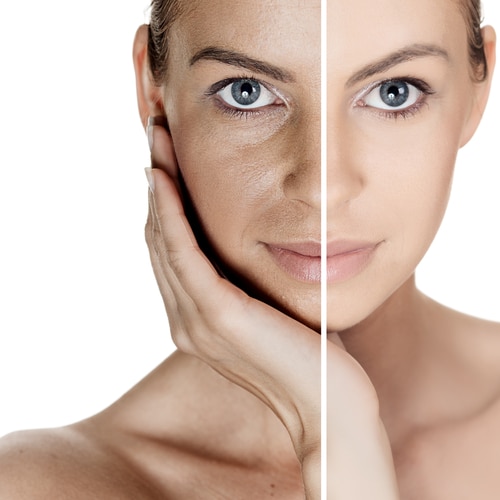
Intrinsic vs. Extrinsic Aging
There are two types of skin aging. One is intrinsic or internal aging. This type of skin aging is determined by genetics. The other type is extrinsic aging, which is directly related to factors such as sun exposure. You can have a big impact on this type of skin aging through lifestyle, and extrinsic aging accounts for about 80% of the skin changes that occur with age.
To get a better idea of intrinsic versus extrinsic aging, compare the skin on your buttocks to the skin on your face or chest. See a difference? The skin on your face and chest probably show signs of extrinsic aging due to sun exposure, while your buttocks were shielded from this fate.
Intrinsically Skin is Gracefully Aged
Intrinsically aged skin that hasn’t been exposed to the sun usually has fine wrinkles. There may be some loss of firmness and hollowing of the cheeks from loss of subcutaneous fat, but even at an older age, intrinsically aged skin is “gracefully aged.”
In contrast, extrinsically aged skin that’s been exposed to cigarette smoke, a bad diet, too much alcohol and time in the sun has deeper wrinkles, visible veins, age spots, patchy pigmented areas, obvious sagging, and a rough, leathery texture.
There’s a higher risk of pre-cancerous skin lesions and skin cancers in extrinsically aged skin. Signs of extrinsic skin aging start as early as the 20s for people who smoke and go out in the sun unprotected, and the damage is cumulative. This means you accumulate more and more damage over time that may not show up for years.
You Can Prevent Extrinsic Skin Aging
Extrinsic aging can be prevented by wearing a sunscreen with an SPF of at least 30 daily. Some dermatologists even argue that you should wear sunscreen in your house since UVA rays can penetrate glass. Sun exposure is by far the greatest risk factor for extrinsic aging, but smoking, excessive alcohol use, and a bad diet magnify the problem.
Smoking is bad news for skin. Smokers usually look older than non-smokers of the same age. Puffing on a cigarette increases the breakdown of the elastic and collagen fibers that give skin its support and help it resist wrinkling. The nicotine in cigarettes also dehydrates the skin and reduces blood flow to the skin surface. That’s why smokers often have dry skin with a pasty appearance. Smokers frequently have premature wrinkling around their mouth from repeatedly pursuing their lips.
Too much alcohol and a bad diet take their toll on the skin too. Alcohol and a bad diet deplete nutrients the skin needs to stay firm and youthful. On the other hand, a diet rich in fruits and vegetables helps to preserve skin due to their high antioxidant content.
The Bottom Line?
You have more control over how fast your skin ages than you think. Genetics play a role, but the other 80% is lifestyle. Wear a sunscreen every day, eat an antioxidant-rich diet and don’t expose your skin to cigarette smoke. You’ll be rewarded with skin that looks younger than its age.
References:
Cosmetic Dermatology: Principles and Practice. Leslie Baumann, M.D. 2002.
New England Journal of Medicine. 337: 1463, 1997.
Related Articles By Cathe:
How Skin Ages (And What You Can Do to Keep It More Youthful)
The Effects of Exercise on Your Skin
How Exercise Affects Your Skin
New Evidence Shows that Exercise Slows the Aging Process – and in an Unexpected Way
What Causes Saggy Skin on Your Body & Can You Correct It?
How Much Control Do You Have Over Aging?
How Sugar Increases Your Risk for Heart Disease and Premature Aging
Combat Cellular Aging by Sitting Less
Can Eating Vegetables Make You Look Younger and More Attractive?
How Extreme Diets and Yo-Yo Dieting Ages Your Skin
How High-Intensity Interval Training Slows Aging at the Cellular Level

